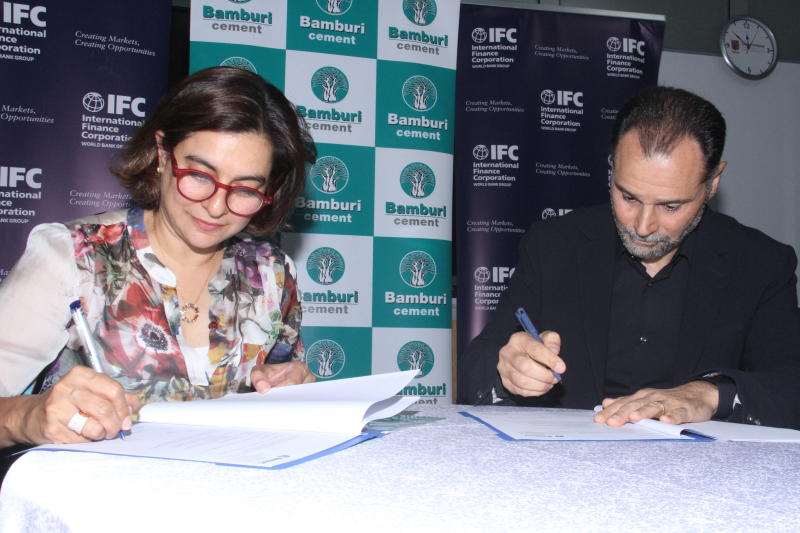Fostering a world that works for all through strategic programs and partnerships
At Bamburi Cement we recognise that sustainable practices as critical business imperatives that seek to create value for the business, people and the planet.
We remain committed to bringing our sustainability ambitions to life, through tangible initiatives investments and programs that uphold the tenets of responsible corporate citizenship.
Our sustainability agenda is underpinned by our overarching intention to ‘Build progress for people and the planet’.
Corporate Social Investments (CSI) strategy
As a responsible corporate citizen we partner with communities, especially those around our operations to support in their need areas and be a contributor to their growth. Our approach to Corporate Social Responsibility (CSR) moves from a peripheral concern to ‘give back to the society’ to a strategic engagement with communities to create ‘shared value’, that is value for both communities and the business.
Our CSR strategy seeks to integrate responsible business practices into our company and to involve and cooperate with various stakeholders towards the welfare of the communities in the areas where we operate. Where possible we work in partnership with the government and non-governmental organizations with expertise in the focus areas we are interested in and actively engage our employees in these CSR activities.
Our strategy acknowledges communities that are impacted by our operations are significant stakeholders. We therefore engage communities within the areas we operate by seeking their views as our stakeholders through regular forums either directly or through community opinion leaders/representatives.
Our business model provides for extensive business partnerships through the outsourcing of non-core functions and processes. We have chosen to actively involve our business partners in sustainable business practices and observance of our code of conduct and ethical business.
The company undertakes various CSR initiatives for communities and organizations in order to demonstrate its commitment to improving their social wellbeing and in accordance with the guidelines laid down in our Corporate Social Responsibility manual.
Bamburi’s commitment to Health and Safety practices towards zero incidences
At Bamburi Cement Health, Safety and Environment (HSE) is our overarching value. Simply put, work does not go on if the health and safety of anyone is compromised. These are key efforts towards the ambitious goal of having zero safety incidences within our operations.
We reflect on our journey, and how we have become an authority in Health, Safety and Environment in our industry, as we continue to share our best practices with different stakeholders – both government and private sector – and learn from others as well.
A few things that have supported our health and safety progress:
At Bamburi Cement, Health, Safety and Environment (HSE) is an overarching value. It takes precedence over production or any other business priorities. Leadership team leads from the front and by example.
Led from the top makes it part and parcel of day to day operations, as opposed to a stand-alone activity. It’s part of our culture, and easy for employees and partners to emulate.
Our “Boots on the Ground” program supports our leaders to spend time on the ground where operational work is ongoing, engage with employees to reinforce positive safe behaviors and practices, as well as together with the employees identify hazards and have them resolved speedily. The engagements and hazards identified are logged into our H&S system as Hazards Ids or Visible Personal Commitment (VPC) conversations, for tracking and closure of actions.
Worker shadowing is also part of leadership KPIs, where leaders ‘walk in the shoes’ of workers, be able to relate with and understand their pain-points and successes, and then together come up with solutions to make carrying out their work safer.
Every activity, be it production, maintenance, a truck driving in to load cement, or a cleaner cleaning an office, begins with a simple question: is this job safe to do? Have all the risks been identified and mitigated following the hierarchy of controls? A continuous improvement mindset and systems in place to identify safer practices.
Systems to support consistency and eliminate discrepancies. We have Standards, Policies and Rules that everyone lives by – and not just staff, but our partners as well. To engage any supplier part of requirements is to check and ensure they meet the HSE requirements, then we continuously audit and support them to have continuous improvement throughout our engagement.
Manufacturing operations come with high health and safety risks. Examples of how we anticipate, prepare and respond to crises where health and safety is concerned.
Industrial operations safety
- Anticipate – We look at what can go wrong, based on what has happened elsewhere, in similar operations as ours. What can we do to prevent it from happening to us?
- Prepare – Critical Controls Management program supports us by pre-identifying 8 high risk jobs in our operations and systematically carrying out a gap assessment, identifying actions.
- Respond – With the support of our leadership team the actions are closed in a sustainable way thereby eliminating risks. Audits (internal and external), assessments and tests are continuously carried out to ensure the mechanisms stand the test of time and would avert incidents.
Road safety
- Anticipate – Our operations are logistics-heavy, and because of road conditions and the fact that we have no control over unsafe behaviors of other motorists, we have to always anticipate accidents.
- Prepare – through two key ways: an ongoing defensive driving training and refreshers program for our drivers, and the IVMS (In-Vehicle Monitoring System). Each vehicle is fitted with IVMS which helps to proactively monitor the driving behavior of drivers – we monitor harsh (emergency) braking, harsh acceleration, speeding, free-wheeling (driving in neutral gear), fatigue driving among others, which are common causes of accidents.
- Respond – After every trip we review with the driver their performance in these areas, and give them feedback to correct any issues identified. This way we proactively work at changing behavior before it results into an accident. Through our reward & sanction policy we also reward those who do well to reinforce behavior, but also sanction those who do not change.
The same has been with the Covid-19 preparedness plan – where we continue to anticipate, prepare and respond to the changing health risks during the pandemic.
Diversity, Equity and Inclusion
In Bamburi Cement, we believe that cultural diversity – in backgrounds, experiences, and perspectives – makes us stronger both as a company and a community. We aspire to be a model employer by leveraging Diversity, Equity & Inclusion (DEI) to empower our people, deliver the best service to our clients and make a meaningful difference in the communities in which we operate.
We continue to shape our company strategies to advance DEI by launching strategic programs around key need areas. We declared our commitment to gender equality and women empowerment agenda by signing up to the UN Women’s Women’s Empowerment Principles (WEP). Our strategic business targets include gender diversity targets, not only as an overall target but detailed in our sourcing and industrial scopes. We also continue to review gender equality continuously in areas such as talent and succession planning, reward and resourcing, learning and development, turnover and grievances to ensure that our work environment attracts, retains and grows women across different levels.
Women on wheels program
Bamburi Cement launched ‘Women on Wheels’ (WoW) a female-centered training and recruitment program seeking to encourage more women to take up truck driving as a career.
The program, a first in the country, brings together key players in the transport industry who are keen on eliminating the entrenched male culture, improving working conditions and ensuring safe workplaces. Partners in the program include Isuzu East Africa, Kenya Transporters Association and four other organizations.
Through the program, the women undergo rigorous technical truck operation and defensive driving training where they are equipped with skills on how to operate heavy trucks, including simulator exercises that expose them to different truck driving techniques; road safety, and soft skills training and coaching. The program targets to recruit and train 100 women every year, as it contributes to breaking the gender bias and leveling the playing ground for women to the enter the career, influencing gender quality in our supply chain, and improving safety as research shows women as safer drivers.
Sourcing2Equal program

To boost the participation of women in the Kenyan supply chain, Bamburi Cement has also partnered with International Finance Corporation (IFC) on a gender program, dubbed Sourcing2Equal, that support the company to increase procurement opportunities for women-owned enterprises in Kenya.
Bamburi Cement has made three commitments under the partnership: to develop and implement a gender-inclusive sourcing strategy, collect gender disaggregated procurement data, and invest in a targeted supplier outreach program that will raise awareness on procurement opportunities at the company among women-owned businesses.
Through the supplier outreach program, Bamburi Cement will hold business match-making events and pitching lessons to empower women-owned small and medium enterprises (WSMEs) to participate actively in procurement. In addition, Bamburi Cement will conduct awareness and advocacy activities to help promote the business case for sourcing from women-owned businesses. The partnership will help Bamburi Cement diversify its supply chain and support WSMEs to offer competitive products and services and provide them with the skills to meet procurement requirements in the private sector.






